by Whitney Cherry | Mar 8, 2019
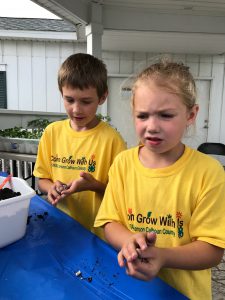
Wildflower seed bombs are a great indoor or outdoor project with unlimited potential for learning.
Wildflower seed bombs are the perfect project for kids itching to get outside. Even if you don’t have a green thumb or you don’t have outdoor space or the weather isn’t cooperating, you can make seed bombs that will help beautify roadsides, vacant areas and neighborhoods.
Give Them a Toss!
These little beauties don’t get their name from any explosive properties but from the fun you have “launching” them around your yard or neighborhood. As you toss them into places that aren’t frequently mowed, you beautify your neighborhood and provide an invaluable food sources for native Florida pollinators like bees, wasps, butterflies, and more.
Even though you may be more fond of some pollinators than others, there’s no doubt we need them all. Their pollination services are critical to fruit development in many of our fruiting crops. So if you like squash, cucumbers, melons, almonds and so much more, here’s what you can do to help:
Gather Your Materials
- Air-dry clay
- Wildflower seeds
- Potting Soil
Make Your Seed Bombs
- Pinch off a small amount of air-dry clay – enough to make a ball about the size of a bouncy ball or about 1″ diameter.
- Work equal parts seeds and soil into the clay and form it into a ball.
Amounts really are up to you. More seeds = more flowers.
But, too much soil will keep the ball from holding it’s shape. If this happens, add more clay and either have a bigger bomb, or divide it into two smaller bombs.
- Store them in a cool dry place and let them dry out completely in an air-tight container until you’re ready to spread some wildflower cheer.
- Now for the fun part! Toss them where you want flowers to grow.
Things to Consider…
- The air-dry clay acts as a binder only. It’s natural, non-toxic, and when wet, it will soften and allow the seeds to grow.
- Before storing in an airtight container, allow your seed bombs out to dry completely. Even a little moisture will allow the seeds to sprout.
- Be careful when throwing your seed bombs.
- Don’t hit people, animals, or other anything else with them – just the ground.
- Throw them where areas don’t get mowed very much. Some people throw them out along roadways or in abandoned lots. If these places are mowed regularly, they won’t last long if they even get to bloom.
- Get permission if you’re throwing them in public places.
Resources
Gardening is just one of the many Florida 4-H programs. To see what programs are available in your county, contact your local UF/IFAS Extension office, or contact your 4-H Agent about starting a gardening program in your county.
by Jena Gilmore | Jan 18, 2019
While this year’s hunting season is winding up, it’s never too early to think about getting ready for next year. Whether it’s deer, squirrel, ducks, dove or turkey, there are important hunting rules and guidelines both youth and adults must follow. Organizations like the Florida Fish and Wildlife Conservation Commission (FWC) and your local UF/IFAS Extension Office provide programs to keep you on target each hunting season!
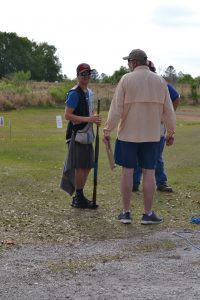
Safety is a key element of any shooting sport.
SAFETY FIRST
Each hunter must take some version of the Hunters Safety Education course. Anyone born on or after June 1, 1975, and 16 years or older, must pass a hunter safety course before a hunting license can be purchased. There are four options to complete this requirement:
- Traditional Course and Skills Day
– Face-to-face instructor led course
– Hands-on skill day – register here
- Online Course and Skills Day (two part process)
– Complete one of the online courses
– Hands on skill day – register here
- Florida Virtual School Outdoor Education
– FREE to Florida students in grades 9-12 or ages 12-18
– Apply here
– Earn 0.5 credit for high school
- Firearms Safety Certification and Online Course
– Adults only
– Must have completed previous firearms training
– Must complete one of the online classes in Option 2
– Follow procedures outlined in the Application for Hunter Safety Certification
If you’re using the Hunter Safety Mentoring Exemption and hunting under the supervision of a qualified hunter, you are exempt from this requirement.
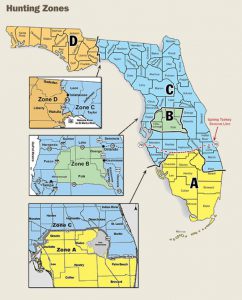
Our district covers Zone D – Escambia to Gadsden/Wakulla & Zone C – Leon & Jefferson. Map courtesy of FWC.
Find Your Zone
Hunters should strive to be good stewards of Florida’s resources to keep this sport a tradition for generations to come. Take the time to determine what hunting zone you live in. Your zone determines your hunting season – meaning the appropriate time you can collect specific game in that area. You can find the Florida Hunting Zones Map here: http://myfwc.com/hunting/season-dates/zone-map/. Next, check the annually updated hunting season dates and bag limits related to your zone to stay in compliance with FWC regulations: http://myfwc.com/hunting/season-dates.
4-H Shooting Sports
Find your local UF/IFAS Extension Office and determine if there is a 4-H Shooting Sports program in your county. Participation in a 4-H Shooting Sport program provides year-round opportunities for youth to not only practice their discipline but also to explore other disciplines in a safe, inclusive, environment with 4-H volunteers/mentors!
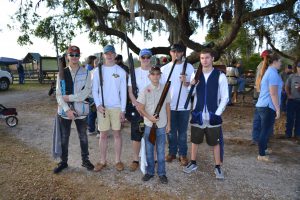
4-H grows important life skills like responsibility, goal setting and teamwork in youth through shooting sports.
4-H Shooting Sports includes air rifle, small bore rifle, archery, shotgun, muzzleloading and hunting and develops important life skills in a safe and educational environment. Shooting sports day camps are popular during the summer, so ask you 4-H Agent if one will be scheduled for you county.
Attention Volunteers!
Would you like to become become 4-H Level 1 Certified to coach and teach youth shooting sports? If you are already enrolled as a 4-H volunteer, log in to your profile and register for the February 16th hands-on training in shotgun and archery. You’ll also complete five online learning modules as part of your training. If you’re new to 4-H, enroll at florida.4honline.com, and let your county 4-H Agent know that you are interested in teaching shooting sports.
Explore the links below to see how you and your youth can get involved in 4-H and stay up to date on the hunting regulations for your area:
by Melanie Taylor | Apr 24, 2017
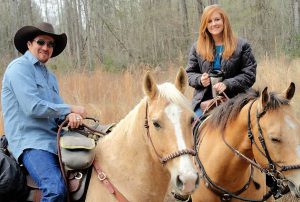
Russell and Julie McMillian, Gulf County 4-H Alumnae and 4-H Leaders
Russell and Julie McMillian both grew up in Gulf County and together have established a thriving business based on their love of horses. They now own a small farm in Dalkeith, just south of Wewahitchka, and their business Rockin’ M Ranch, consists of horseback riding lessons for beginners and beach rides for tourists and locals alike along the beautiful beaches of Cape San Blas.
How did this all begin? Russell and Julie both grew up as Gulf County 4-H members of the Big River Riders 4-H Club. They both participated in a variety of 4-H programs; including Horse Camp, Camp Timpoochee, Congress (now known as 4-H University), District Events, North Florida Fair Ag Judging, Area A and State 4-H Horse Shows, etc. They both learned the values of 4-H through learning how to raise and compete with their animals, agricultural commodities, leadership skills, public speaking, community service, good decision making skills, and much more…
As adults, they both went in separate directions, but still maintained their love of horses and the farm life. Russell began his career in flooring and tile work, while Julie received her education degree and taught Kindergarten at Wewahitchka Elementary School. After reconnecting as adults, they married on September 25, 2010 and turned their passion for horses into a full-time love by creating their own business, Rockin’ M Ranch. Russell still does flooring, tile work on the side, and helps his grandparents with their hay business. Julie decided to leave the teaching field, and she manages their business full time. She began giving beach rides on the Cape at the age of 14 and still loves it as much today.
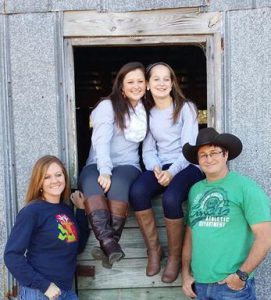
Julie and Russell McMillian pictured with Brooke (left) and Hayleigh (right).
Russell began his time with 4-H at the age of 12 and Julie was 8 years old. As members of the Big River Riders 4-H Club, they adored their 4-H leaders, Mr. Jesse Eubanks and Ms. Jean McMillian (Russell’s grandmother), and the Gulf County Extension Director, Roy L. Carter (now retired), whose passion for horses was contagious. Julie explained that she was a very shy child and that participating in public speaking for District Events really helped her come out of her shell. They both loved learning the values of the four H’s: Head, Heart, Hands, and Health. They feel 4-H has helped them develop into productive adults with good decision-making skills and in-stilled in them the importance of giving back to their community. They have served as 4-H volunteers for the Big River Rider’s 4-H Club since Russell’s daughters joined 4-H years ago; Brooke (17) and Hayleigh (15) also ride horses and have competed in a variety of Gulf County 4-H programs throughout the years. Russell and Julie have also taught a variety of horse riding classes at multiple Gulf County 4-H day camps.
As 4-H and community leaders, their most important goal is to give back to the community that gave to them as 4-Hers growing up here. They really love introducing new riders to the love of horses and 4-H. On any day, Russell and Julie can be found throughout the county at various events supporting 4-H members and any youth for that matter.
When asked what advice she has for someone thinking about becoming a 4-H volunteer she said, “Do not have regrets…just do it. Do not be scared off by the fingerprinting and application process. It is quick and easy, and maintains the safety for you and the children. Get started! 4-H is a great opportunity for youth and adults.”
“As a 4-H extension agent, you can only hope to find 4-H volunteers as dedicated as Russell and Julie McMillian. Their passion and love of 4-H is infectious and draws in youth looking for a place to belong.” -Melanie Taylor, Gulf County 4-H Agent
For more information about Rockin’ M Ranch, please go to http://www.therockinmranch.com/. For more information about how to become involved in 4-H, either as a youth member or adult volunteer, visit florida4h.org or contact your local UF IFAS County Extension Office. 4-H offers a variety of roles for volunteers to share their passions, skills and interests.
by Melanie Taylor | Mar 23, 2017
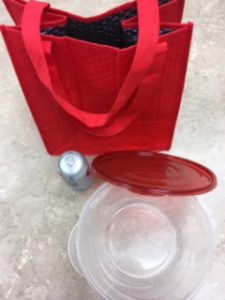
Do you remember the 3 R’s? If you are over the age of forty you are probably thinking of a classroom, a teacher, and learning about Reading, wRiting, and aRithmetic. These are the basic standards for learning, of course. However, it is now 2017and the 3 R’s have a new meaning to a new generation of young people: Reduce, Reuse, Recycle!
In today’s society, we constantly hear concerns about the environment and how we need to implement changes to make a positive impact upon its future. It is nearly impossible to pay attention to any media without feeling bombarded by messages of conservationism. “Go Green!” “Green… it’s the new black.” “Reduce, Reuse, Recycle.” However, are these sentiments new? Think about it. “Give a Hoot… Don’t Pollute.” “Keep America Beautiful.” “Keep Our Forests Green.” The use, or abuse, of our natural resources has long been an issue debated by our nation. It has more or less been the price we have had to pay for progress; but regardless of one’s political views and beliefs, the fact that Earth is the only planet that will sustain human lives is a hard fact to deny. It is therefore critical that all of promote principles of conservationism for our future generations.
The practice of reducing, reusing, and recycling may be easily incorporated into many aspects of your everyday lives. As YOU reduce, reuse, and recycle in your daily lives, you will be teaching by example your own children at home. Knowing that youth learn by seeing and doing, they will be much more likely to implement the practices of reducing, reusing and recycling into their own daily lives if they see you practicing the 3 R’s in yours.
How does the Environmental Protection Agency describe each of the 3 R’s? Reduce the amount and toxicity of trash you throw away. One way is to turn off or unplug lights during the day. Doing so will save energy and help your lights last longer. Use food scraps, yard trimmings, and other organic wastes to create a compost pile. Adding the compost you make to soil increases water retention, decreases erosion, and keeps organic materials out of landfills. Reuse containers and products. There are many creative ways to reuse items, which might normally find their way into the waste stream: old shoeboxes may be used for storage, plastic containers for planters, etc. You can also donate or give away items rather than throwing these items away. For a large number of unwanted items, you can hold a garage sale. It is also encouraged to shop at garage sales before buying new!
Recycle as much as possible and buy products with recycled content. Recycling includes collecting, sorting and processing certain solid waste into raw materials for re-manufacture into new items. These all help to cut down on the amount of waste we throw away. They conserve natural resources, landfill space and energy.
In addition, the three R’s save land and money communities must use to dispose of waste in landfills.These are all things we can do daily with just a little thought and effort. In fact, businesses are making it easier for us every day. We can reduce our trash in many ways, but an easy way is to reuse water bottles instead of throwing them away after each use. We can use the reusable bags that many stores now offer for our purchases; this is a great alternative to using plastic shopping bags. Of course, we can all make more of an effort to recycle by collecting our newspapers, aluminum cans, plastic bottles and glass jars for local recycling centers. If there are not recycling centers in your area maybe you should start one or pursue your community leaders about the importance of having one.
A few points to consider…
- The average American produces about 4.5 lbs. of garbage per person per day. This equal 235 million tons a year.
- Recycling 1 ton of paper saves 17 mature trees.
- Recycling 1 aluminum beverage can saves enough energy to run a 100 watt light bulb for 20 hours, a computer 3 hours, or a TV for 2 hours. (Currently, 45% of aluminum cans are recycled.)
- Reduce and reuse by donating old clothes and items to charities.
By instilling the importance of the 3 R’s into today’s society we will be helping clean the planet for the future. After all, “A true conservationist is a man who knows that the world is not given by his fathers but borrowed from his children.” As quoted by John James Audubon. Our state 4-H service project theme for next year is the environment. Why not consider planning a club, county or district service learning project in honor of Earth Day?
Source:
United States Environmental Protection Agency , https://www.epa.gov
by jgl1 | Mar 3, 2017
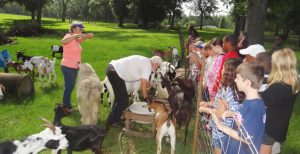
Fred and Bobby teaching a group of 4-Hers about goats.
Fred and Bobbie Golden relocated to Jefferson County from Lakeland, Florida in 2000 to establish Golden Acres Ranch LLC. The sixty-three-acre ranch is home to one of the largest mayhaw ponds in the region, grass fed goat & sheep, free-range chickens, guineas, pet boarding, and a country store.
Bobbie and Fred have genuine love for Jefferson County 4-Hers. Can you tell the difference between a sheep and a goat? Jefferson County 4-H campers can! For the past six years, 5-8 year old youth visited their ranch during 4-H day camps for some hands-on learning about agriculture. The campers have opportunities to feed, pet and learn important facts about Tennessee Fainting Goats, sheep, Pyrenees and Maremma, chicken, guineas and other animals reared on the farm.
Abagail Loveless, day camp participant said, “the reasons I like to visit Golden Acers Ranch, you get to feed, pet, learn things about the farm animals and swing on the tire/rope. “London Skipworth indicated that she was afraid of chickens, but with help and support from teen counselors and 4-H Staff, she was able to overcome her fears. London now plans to participate in the 4-H Chick Chain Project this year.
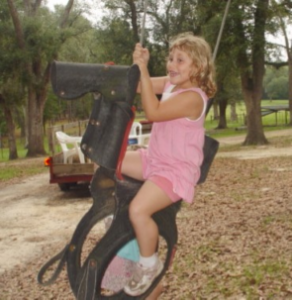
After a day of farming, Abigail enjoys a tire swing
Bobbie Golden, said “I like inviting the campers to the ranch because I like teaching them interesting facts about our farm animals, but most importantly bringing the youth back in touch with agriculture.”
Bobbie is a member of the Jefferson County Extension Ag Advisory and Vice President of the Overall Extension Advisory Committee. Bobbie also chaired the Extension Office open house committee. Bobbie and Fred support Jefferson County Extension in every capacity.
Annually, Jefferson County Extension participates in the Millstone Farm Tour and the Mayhaw Festival; both held events at Golden Acers Ranch. Each Extension program area provides interactive displays and hands activities for the youth and adults. For more information about Golden Acres Ranch, please go to https://goldenacresranchflorida.com/.
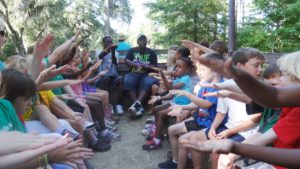
Campers leading songs on a hay ride around the farm.
by Marcus Boston Jr. | Sep 29, 2016
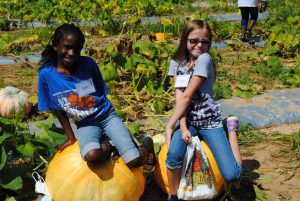
Youth learn about pollination and nutrition at the pumpkin station. The center grows several varieties to demonstrate the diversity of the plant family.
What has 1600 eyes, 1600 legs, can be male or female, and has enough energy collectively to send a rocket to the moon? The 3rd – 5th graders that participate in the multi-county 4-H Ag Adventures Program! This educational adventure is held annually during September at the UF/IFAS North Florida Research and Education Center in Quincy, Florida. This event helps youth understand where their food comes from, the importance of agricultural industry in Florida, and career opportunities in agriculture related fields. Students are introduced to field crops as they rotate through stations that cover peanuts, corn, cotton, pollination, pumpkins, and soils. At each station county extension agents and IFAS research faculty provide “hands on” presentations that are prepared to enhance the students learning experience.
In addition, this event is a platform for youth to learn the current trends, issues and challenges farmers face as they continue to try to feed our increasing population. Some of these trends and challenges include food safety and bio-security, farm labor, bio-security, land use, pest and disease control, and the use of technology in agriculture. This issues encompass all four of the “H’s” in 4-H: Head, Heart, Hands, and Health.
While some youth still associate “agriculture” with increasing negativity (thinking of the hot sun, extreme fatigue, very hard work, minimal income), a recent poll shared on the website Worldbank.org/youthink/ states the top three reasons youth should consider a career in agriculture are the following:
1. Agriculture matters to the future of development,
2. Agriculture can be a gold mine for young entrepreneurs,
3. Agriculture research needs young brain power.
Regional 4-H Agent Heather Kent shares:
“Although this event is geared towards teaching youth about agriculture, the parents and teachers that attend learn just as much and often have more questions that the youth! The adults are just as curious and amazed at how much agriculture affects their daily lives- especially if they do not have an agricultural background. Most of them have no idea how many careers are related to agriculture or how much today’s farmers utilize technology. It’s a real eye-opener for them.”
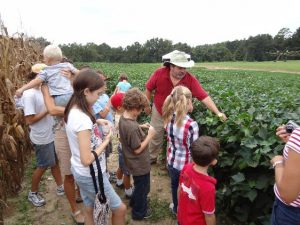
Ag Agent Jed Dillard teaching youth about cotton. Do you know how many pairs of jeans you can make out of a bale of cotton?
This program is sponsored by UF/IFAS, it is also supported by both Florida Farm Bureau and Farm Credit of Northwest Florida. These organizations not only provide funding to help pay for the transportation for students to attend, but they also provide corporate volunteers to help make the event happen. If your child’s classroom missed out on this opportunity, it’s not too late. The North Florida Research and Education Center in Quincy is hosting “Art in the Garden” festival Saturday, October 1st from 9AM -2PM. The event is FREE and open to the public. This event is a great way to learn about agriculture in a fun and family friendly way. There will be trolley tours, demonstrations, games, arts and crafts and food.
In the near future the students that pass through our stations will grow into the adults that will be making important decisions about our food systems. It is in that spirit that we must continue to teach them ….from the ground up. Visit http://faitc.org/kids for more information on careers in agriculture.
If you have a passion or agriculture, consider serving as a 4-H volunteer or advocate to help inspire the next generation. Contact your local UF IFAS County Extension Office or visit http://florida4h.org.












